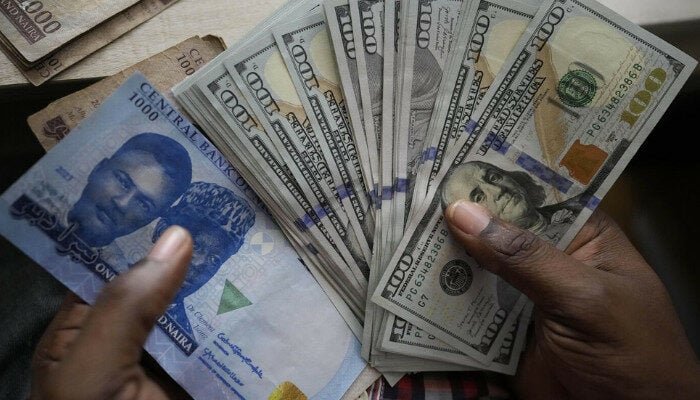Foreign exchange (FX) inflows into Nigeria rose notably in July 2025, signalling an improvement in investor sentiment despite ongoing challenges that kept the naira under pressure.
According to an FBNQuest report, “total inflows climbed to approximately $3.8 billion in July, up from $3.1 billion in June,” representing a 24 per cent month-on-month increase.
This regained momentum was driven largely by non-bank corporates, which overtook foreign portfolio investors (FPIs) for two consecutive weeks, as revealed by FMDQ data.
In a related development, the dollar’s value slipped on Wednesday after the United States of America’s President Donald Trump demanded the resignation of Federal Reserve Governor Lisa Cook. This move rattled investors awaiting policy signals from Fed Chair Jerome Powell’s speech at Jackson Hole on Friday.
This did not lift the naira as the value of the local currency weakened further to N1,536.73 to the dollar at the Nigerian Foreign Exchange Market (NFEM) on increased demand. Similarly, the value of the naira weakened to N1,550 at the parallel market.
The value of the naira, which began the week at N1,533 and N1,540 to the dollar at the NFEM and parallel markets, respectively, recorded depreciations as demand increased to meet vacationers’ needs and pay school fees.
However, analysts say they expect the naira’s value to remain stable within the N1,530 band at the official market, supported by the Central Bank of Nigeria’s continued interventions and reforms.
FBNQuest analysts pointed out that, although FPIs “remained the single most significant driver of inflows overall, contributing around 45 per cent of July’s total,” inflows were still “well below the $6.7 billion peak recorded in May,” highlighting continued volatility in FX liquidity. Offshore investor inflows rose modestly to $1.7 billion from $1.5 billion in June, reflecting “tentative foreign investor interest amid favourable carry trade dynamics and relatively stable global macro conditions.” However, the analysts cautioned that Nigeria’s “reliance on FPI flows provides near-term FX support but exposes the market to external shocks,” given these flows’ sensitivity to global risk sentiment, interest rate movements, and domestic macroeconomic stability.
Data from Coronation Merchant Bank revealed a shifting pattern in FX supply composition. In one week, non-bank corporates emerged as the top contributors with $227.4 million, accounting for 28.88 per cent of supply, followed by exporters at $179.6 million (22.81 per cent), the Central Bank of Nigeria (CBN) at $171.2 million (21.74 percent), and FPIs at $167.4 million (21.26 percent).
Individuals and other sources contributed 4.73 per cent and 0.57 per cent, respectively. Notably, during that week, “the Central Bank of Nigeria (CBN) made no direct market interventions,” underscoring the private sector’s growing role.
FBNQuest further highlighted a strong pickup in monthly inflows from non-bank corporates, which “rose from $800 million in June to $1.2 billion in July.” This increase was attributed to “improved export earnings—particularly from upstream oil producers’ repatriated profits—and better access to formal FX channels.”
Despite the stronger reserves, the CBN stepped up its market interventions in July, “selling $326 million compared to $183 million in June,” to address rising FX demand and support the naira. However, the naira experienced a slight depreciation of 0.13 per cent month-on-month, closing at N1,534 per dollar. Analysts warned that “despite improving sentiment, structural challenges such as liquidity constraints and global headwinds may weigh on the sustainability of higher inflow levels in the near term.”
The naira’s weakening continued into August, with the currency quoted at N1,534.93 to the dollar on Tuesday, a slight decline from N1,533.67 on Monday at the Nigerian Foreign Exchange Market (NFEM). The parallel market saw the naira hold steady at N1,545 per dollar initially but later depreciated further to N1,550. The pressure on the naira was driven in part by increased demand to “meet vacationers’ needs and pay school fees,” as the local currency began the week at N1,533 (official market) and N1,540 (parallel market).
However, market analysts expect the naira’s value to remain relatively stable around the N1,530 band at the official market, supported by the CBN’s continuous interventions and reforms. However, the uncertainty caused by U.S. policy developments looms large. Trump’s call for Cook’s resignation followed allegations of mortgage fraud, which many saw as political interference in the Federal Reserve. Marc Chandler, chief market strategist at Bannockburn Global Forex, told Reuters that “the market has voted with its pocketbook that it doesn’t like when the president interferes with the Federal Reserve.”
Adding to the complexity, Trump nominated Stephen Miran earlier this month to fill a vacant Fed seat, signalling potential shifts in the U.S. central bank’s composition as Powell’s term ends in May.





